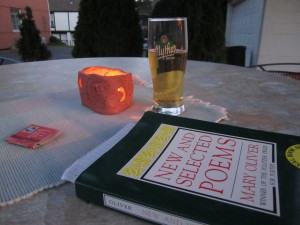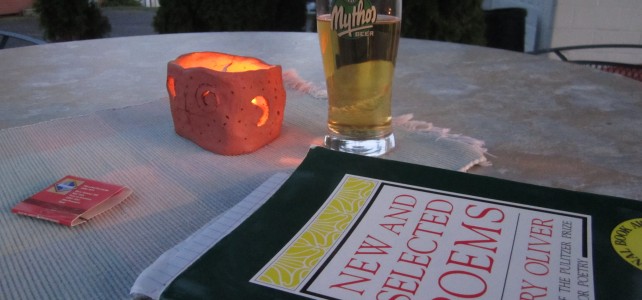
“I have energy,” I thought as I drove home from work around 4pm. I noticed because lately, I haven’t. Maybe it was not using my CPAP machine regularly (no excuse for that) or that my shift was over before the sun set. Maybe it was the magnificent cool weather. Whatever, I had a spring in my step even after an hour of running errands. I decided to have a cookout.
I put brats in a pan of beer to precook and simmered canned baked beans with onion, mustard, and molasses. The grill was heating up and I tackled dishes left in the sink. Then, when I put the brats on, I placed a candle on the outside table and sat down to read some poetry and drink the Heineken I hadn’t used to cook the brats.
Pink clouds streaked the sky. Swallows dipped and soared. And Mary Oliver took me to dark summer ponds covered with lilies. (“The Ponds” in New and Selected Poems, p92-93.)
I plopped a couple of brats into whole wheat buns slathered with Dijon mustard, scooped baked beans into a little bowl and mounded the remaining space of my plate with some chips.
My neighbor has been sharing tomatoes, and even though the one I sliced was sweet, I sprinkled a little sugar on one slice to remember my mom and dinners around the table when I was a child. We always sprinkled tomatoes with sugar. Maybe it was a ploy to convince the kids to eat their vegetables. I enjoyed the taste and the memories.
So, I sat, munching dinner under a darkening sky and reading “The Ponds,” marveling along with Mary Oliver at the light of countless lilies floating on dark summer ponds. At first the lilies appear perfect, but on closer inspection, they reveal blemishes, lopsidedness, one “wearing an orange blight.” In the end, the imperfections are not what matter. It is the light.
I finished my dinner and opted for a second helping of baked beans scooped up with potato chips over the Klondike bar calling from the freezer. And I took a second helping of “The Ponds,” reading it again, luxuriating in the final stanzas:
“Still, what I want in my life
is to be willing
to be dazzled—
to cast aside the weight of facts
and maybe even
to float a little
above this difficult world.
I want to believe I am looking
into the white fire of a great mystery.
I want to believe that the imperfections are nothing—
that the light is everything—that it is more than the sum
of each flawed blossom rising and fading. And I do.”
“I do, too,” I said to Mary Oliver wherever she may be. “I do, too.”

Speak Your Mind